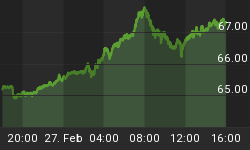To paraphrase the great Steve Martin, today's investors are very passionate people and passionate people tend to overreact at times. An overreaction is exactly what's happened in gold and global markets in recent weeks. While market bulls have been sniffing out data points to support their case, market bears have continued to take a glass-half-empty approach.
Gold and China are two areas that have been caught in the bear trap this week, but we believe the gold and China bulls still have room to run.
Short-Term Challenges for Gold
Rising bond yields, a stronger U.S. dollar and an improving U.S. economy have squelched expectations for a third round of quantitative easing (QE3) and consequently, spelled trouble for gold. Since late February, gold has declined more than 7 percent.
As confidence improves, UBS says the yellow metal is losing the dual role of safe haven and risk asset: "Gold is moving off center stage, while growth assets are moving to the fore." Earlier this month, we saw the largest weekly contraction in long gold positions on the Comex since 2004.
As I wrote in my blog this week, the selloff has pushed the price of bullion below its 200-day moving average for only the 30th time over the past 10 years. Over this time period, gold has declined on average 2.1 percent over the 10 days following the cross-below date. This means we're likely only one-third into the correction in terms of price and duration.
All is not lost for gold. In his latest Gold Monitor, Dundee Wealth Economics Chief Economist Martin Murenbeeld lists 10 positive factors for gold, one of which is monetary reflation. We are currently experiencing one of the greatest global liquidity booms the world has ever seen. Over the past seven months, there have been 122 stimulative policy initiatives from central banks around the world, according to ISI Group.
You can see from Canaccord's chart below that injecting liquidity into the global monetary system has been a steroid for stronger gold prices over the past decade. The global monetary base has ballooned three times larger, with gold increasing nearly six-fold.

While we are seeing strong signs of improvement in the global economy, it's important to remember that the recovery has been built upon a mountain of printed money that cannot be hastily unwound. Dr. Murenbeeld explains, "Money doesn't grow on trees; it will have to be borrowed by some government and/or it will have to be printed by some central bank."
This is why we believe the bull market for gold remains intact.
Overreaction on China
Indication of a Chinese economic slowdown and negative comments from BHP Billiton regarding its outlook for Chinese demand caused anxiety for investors this week.
The March HSBC Flash Manufacturing Purchasing Managers' Index (PMI) fell 3 points from the previous month due to weakening domestic and external demand.
However, Macquarie says, "It's not that bad out there." The firm's research shows that relatively strong demand from China during the first two months of the year has had a positive impact on global commodity prices. Macquarie says, "While there is undoubtedly a slowdown taking place in Chinese economic growth as a result of domestic policy tightening and weaker export growth, the impact on commodities demand has been negligible."
As for the BHP comments, Barclays says that they were misconstrued, stating the "BHP executive was by no means bearish on near-term Chinese demand prospects and comments referring to a softening in Chinese steel demand were largely focused on the scenario post 2025 ... the notion that iron ore and steel demand growth is unlikely to grow at a double-digit pace forever is not a surprise to the market."
Bright spots in China's economy aren't hard to find. Barclays reports that the backlog of manufacturing orders saw its largest month-over-month increase since 2005 from January to February of this year. Supported by an all-time high in gasoline demand, Chinese oil demand reached a record high in February. Gasoline demand was resilient despite Beijing hiking prices by 4 percent in February due to higher oil prices. The Chinese government followed that up with an additional 7 percent hike earlier this month. Auto sales increased nearly 24 percent year-over-year (13 percent sequentially) in February, the largest increase since November 2010, according to UBS.
As CLSA's Andy Rothman and I will discuss in our April 5 "Hard or Soft Landing in China?" webcast, higher fuel prices will only modestly impact Chinese consumers because few come in direct contact with unsubsidized gasoline. Andy estimates that fuel accounts for only 2 percent of China's Consumer Price Index (CPI) basket, compared to 5.4 percent in the U.S.
We're also seeing positive developments in an area where Chinese consumers are vulnerable--housing prices. According to CLSA and China's National Bureau of Statistics, home prices fell in 27 cities on a year-over-year basis during February, three times the volume in December. In addition, none of the 70 cities tracked reported more than a 5 percent increase in new home prices. A gradual reduction in home prices is exactly what the country needs to prevent a major housing crash, but don't expect the Chinese government to let the bottom fall out.
Remember, the minimum cash down payment for a Chinese home buyer with a mortgage is 30 percent. Investors are required to put 60 percent down in cash. Currently, about one-third of home buyers are paying all cash, according to CLSA. Andy says the government is poised to relax the country's strict housing policy measures as soon as this summer if the decline accelerates.
We'll be discussing these developments and more during our April 5 "Hard or Soft Landing in China?" webcast with Andy. Sign up today.















